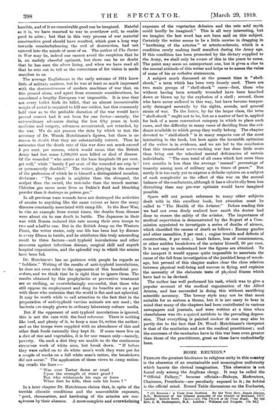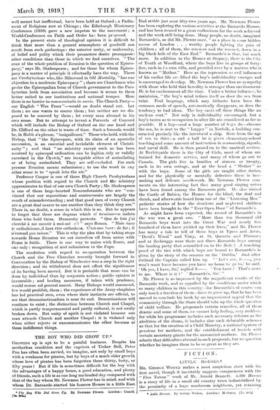HOME REUNION.*
PERHAPS the greatest hindrance to religious unity in this country is the obsession of an unattainable and meaningless uniformity which haunts the clerical imagination. This obsession is not found only among the Anglican clergy. It may be called the "Official Fallacy," because officials—Bishops, Moderators, Chairmen, Presidents—are peculiarly exposed to it ; its habitat is the official mind. Round Table discussions on the Eucharist, • 111 Arun:au: a Voice from Ragland. By the Very. Rev. James Cooper, D.E.. Moderator of the General Asaembly of the Church of Scotland. 1017. London: Robert Reit. 131.1-fe1 The Chtfmh at the Croat Read, by the Bee. J. H. Nuke:Team M.A. Loudon: William. and Forgaes. 175. W.]
well meant but ineffectual, have been held at Oxford ; a Parlia- ment of Religions met at Chicago ; the Edinburgh Missionary Conference (1910) gave a new impetus to the movement ; a World-Conference on Faith and Order ha' been prlpc.ed.
In the present state of theological opinion it is difficult to think that more than a general atmosphere of goodwill can result from such gatherings : the exterior unity, or uniformity, of belief and polity which their promoters desire presuppose: other conditions than those in which we find ourselves. "The crux of the whole problem of Reunion is the question of Episco- pacy," says Mr. Shakespeare ; and for those for whom Episco- pacy is a matter of principle it effectually bars the way. There are Presbyterians who, like Milnwood in Old Mortality, " hae nac objection to a moderate Episcopacy " ; there are Churchmen who prefer the Episcopalian form of Church government to the Pres- byterian both from association and because it seems to them better suited to our institutions and national temper. Here there is no barrier to communicatio in merle. The Church Party— our English " Wee Frees "—would no doubt stand out. Let them ; no one wants to coerce them ; but neither are wo dis- posed to be coerced by them ; let every man abound in his own sense. But to attempt to invent a Formula of Concord which will include the Bishop of Oxford on the ono hand and Dr. Clifford on the other is waste of time. Such a formula would be, Hobb .s's phrase, " insignificant." Those who hold, with the Bishop, that " the Episcopate, with its claim of an apostolic succession, is an essential and inviolable element of Christi- anity " ; and that " no ministry except such as has been received by episcopal ordination can be legitimately or validly exercised in the Church," are incapable either of assimilating or of being assimilated. They are self-excluded. For such persons Reunion means submission ; to use the word in any other sense is to " speak into the air."
Professor Cooper is one of those High Church Presbyterians whose position with regard to the Church and the ministry approximates to that of our own Church Party ; Mr. Shakespeare is one of those large-hearted Nonconformists who are "con- vinced that our separations and controversies are largely the result of misunderstanding ; and that good men of every Church are a great deal nearer to one another than they think they are." There is, no doubt, a sense in which this is so. But he appears to forget that there are dogmas which vi terminorum isolate those who hold them. Humanity protests. " Que de foie j'ai cherche a me mentir A moi-me e " says Renan. " Maio dans Is catholicisme, it Taut etre orthodox.. C'estune berm de fer ; it n'entend pas raison." This is why the plea that by taking steps towards Home Reunion we cut ourselves off from union with Rome is futile. There is one way to union with Rome, and OW only : recognition of and submission to the Pope.
The resolution with regard to co-operation between the Church and the Free Churches recently brought forward in Convocation by the Bishop of Winchester was a step in the right direction ; and its withdrawal does not affect the significance of its leaving been moved. But it is probable that more can be done by individual than by corporate action ; public opinion is favourable ; and healing measures, if taken with prudence, would comm .nd general assent. Many Bishops would commend, few would prohibit, them; the experience of the Army chaplains hae led practical men, even where their instincts are official, to see that denominationalism is near its end. Denominations will continue to exist ; the distinction between Church and Chapel, which is partly temperamental and partly cultural, is not easily broken down. But unity of spirit is not violated because one man attends Church and another Chapel : it is violated only when either rejects or excommunicates the other because of these indifferent things.



































 Previous page
Previous page